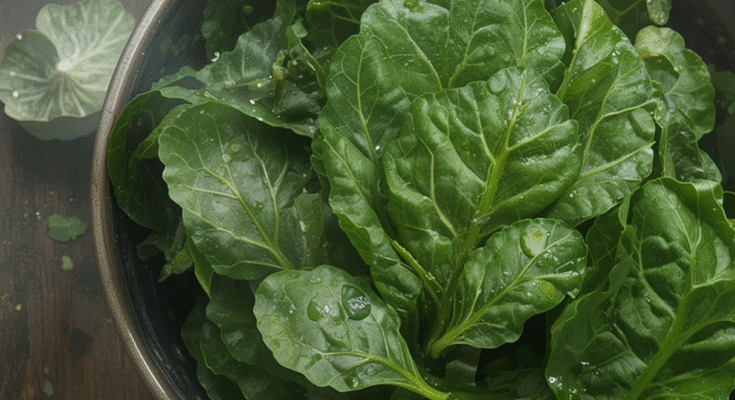🌟 Overview
Spinach is a dark leafy green vegetable belonging to the Amaranthaceae family. Native to central and southwestern Asia, it has become a global symbol of nutrition thanks to its rich content of iron, vitamins, and antioxidants. Spinach is praised for its disease-fighting compounds and wide culinary uses — from raw salads to hearty cooked dishes.
🧬 Nutritional Profile (Per 1 cup raw – Approx. 30g):
-
Calories: ~7
-
Fiber: 0.7g
-
Protein: 0.9g
-
Vitamin K: 181% of Daily Value (DV)
-
Vitamin A (as beta-carotene): 56% of DV
-
Folate (B9): 15% of DV
-
Vitamin C: 14% of DV
-
Iron: 5% of DV
-
Calcium, Magnesium, Potassium, Manganese – in good amounts
-
Antioxidants: Lutein, zeaxanthin, quercetin, kaempferol
💚 Health Benefits of Spinach
1. Supports Eye Health
Spinach is rich in lutein and zeaxanthin, antioxidants that protect the eyes from age-related macular degeneration and cataracts. It also contains vitamin A, which helps maintain healthy vision.
2. Builds Strong Bones
Spinach offers more than 180% of your daily vitamin K, which plays a key role in calcium absorption and bone mineralization — essential for strong, healthy bones.
3. Fights Oxidative Stress
Packed with antioxidants like vitamin C, beta-carotene, quercetin, and kaempferol, spinach helps combat free radicals and reduces inflammation in the body.
4. Boosts Iron and Red Blood Cell Health
Spinach is well-known for its iron content, which is essential for red blood cell production and oxygen transport. Though plant-based iron (non-heme) is less easily absorbed, pairing spinach with vitamin C-rich foods enhances its absorption.
5. Aids in Heart Health
Spinach supports cardiovascular health through:
-
Nitrates that help lower blood pressure.
-
Potassium and magnesium that regulate heart rhythm.
-
Fiber that helps lower cholesterol.
6. Improves Digestive Health
Its fiber content supports healthy digestion by promoting regular bowel movements, aiding nutrient absorption, and nourishing the gut microbiome.
7. Supports Fetal Development
High in folate, spinach is essential for pregnant women as it helps prevent neural tube defects and supports healthy fetal growth.
8. Strengthens the Immune System
Spinach provides vitamin C, A, and E, all of which help the body fight infections and strengthen the immune response.
9. May Help Prevent Cancer
The phytonutrients and flavonoids in spinach have been linked to reduced risk of several cancers, including breast, prostate, and stomach cancer, by neutralizing free radicals and reducing inflammation.
10. Promotes Healthy Skin and Hair
With vitamin A and C, spinach supports skin regeneration, collagen formation, and scalp health, contributing to glowing skin and stronger hair.
🥗 How to Use Spinach
-
Raw: Toss into salads or green smoothies.
-
Sautéed: Cook with garlic and olive oil for a quick side dish.
-
Blended: Add to soups, sauces, or green juices.
-
Baked: Use in lasagna, spanakopita, or egg muffins.
📝 Pro Tips:
-
Pair with citrus (like lemon or orange) to increase iron absorption.
-
Cook lightly to reduce oxalates and improve nutrient bioavailability.
📌 Final Thoughts
Spinach is a low-calorie, nutrient-rich vegetable that offers an impressive array of health benefits — from eye and bone health to iron support and antioxidant protection. Its versatility and nutritional density make it a must-have in any balanced diet.



